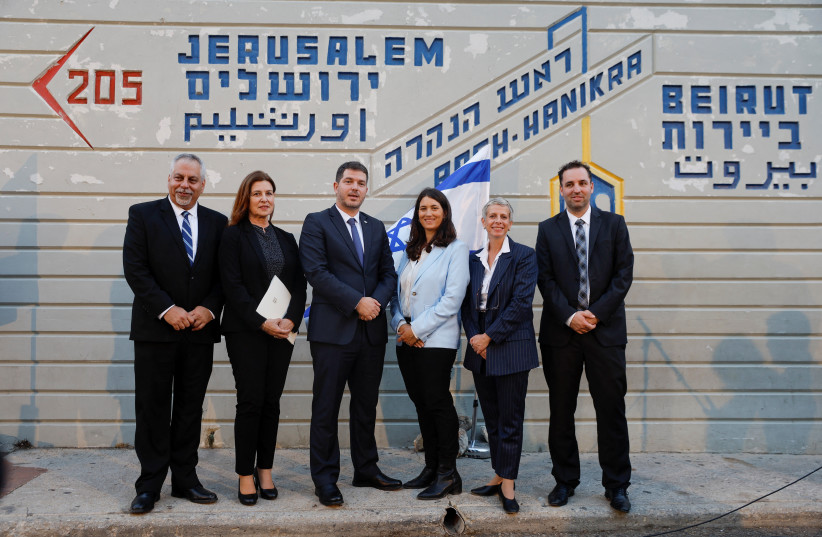Qatar’s potential foray into Lebanon’s offshore gas project could spell trouble for Israel or, alternatively, present it with a rare opportunity for rapprochement, regional analysts say.
For more stories from The Media Line go to themedialine.org
State-owned QatarEnergy is in talks with the Lebanese government to get a 30% stake in Lebanon’s offshore gas exploration, according to a Reuters report published over the weekend. The Qatari oil firm also is negotiating with the French-owned TotalEnergies and Italian-owned ENI, which are part of an international consortium seeking to carry out exploration in the Eastern Mediterranean.
The gas exploration license was initially held by three firms: Total, ENI and Novatek, but Novatek transferred its share to a company called Daja 216, which reportedly also is owned by Total.
News of potential Qatari involvement in the gas project comes on the heels of a historic US-brokered agreement signed between Israel and Lebanon, which put an end to a decades-long dispute over the countries’ maritime borders.

The Qana reservoir, which could be worth billions of dollars, was at the heart of the dispute.
If Qana proves to hold gas reserves, which has not yet been determined, then as part of the agreement Israel would receive an undisclosed amount of royalties from whatever is extracted.
Some analysts are wary of Qatar getting involved, however.
Professor Efraim Inbar, president of the Jerusalem Institute for Strategy and Security, told The Media Line that Qatar is looking not only to expand its gas industry but also to bolster the Iran-backed Hizbullah group in Lebanon.
“Qatar supports Islamist regimes and Hizbullah is Islamist so they have an interest in helping that group, as they tried to help Hamas,” Inbar said. “They are also friendly with Iran.”
International interest in conducting gas exploration in the Eastern Mediterranean has jumped as a result of the war in Ukraine and disruptions of gas supplies to Europe.
“We have no interest in expanding the Qatari hold in our region, and also we should not forget that Qatar is not particularly beloved by countries that are part of the Abraham Accords,” Inbar said, noting that Saudi Arabia and other Gulf nations had previously unsuccessfully tried to ostracize Qatar.
In Inbar’s view, Qatar’s potential involvement brings to light one of the weaknesses of the newly signed Israel-Lebanon maritime deal, namely that it could enable enemy states to expand their interests and influence in the Mediterranean Sea.
According to the Israel Hayom news site, Jerusalem was aware of Qatar’s interest in the project and had no plans to veto the latter’s participation.
“The Israeli government wants to present [the deal] as a great diplomatic achievement and as a step that prevents war with Hizbullah, so they’re not going to [admit] that the agreement is not as good as they had presented it,” Inbar said.
Other regional analysts disagree with Inbar’s assessment and say that Israel has much to gain from Qatar taking part in any offshore exploration.
Dr. Moran Zaga is a researcher of the Gulf states at the University of Haifa and policy fellow at Mitvim – the Israeli Institute for Regional Foreign Policies. Zaga is currently researching Qatar’s growing regional influence and recent rapprochement with the United States.
“Qatar has become a much more legitimate country,” she told The Media Line. “It has always used economic levers to improve its political standing, mainly by utilizing soft power via civil and diplomatic projects.”
While admitting that the country continues to incite against Israel, Zaga does not believe that Qatari involvement in gas exploration will strengthen either Hizbullah or other Islamist groups.
She pointed to what she called a recent “deterioration in ties” between the Biden administration and certain Gulf nations, especially Saudi Arabia. This has led to a strengthening of ties between America and Qatar.
“Qatar does not wish to be viewed as an extremist country and wants to show that it is a pragmatic and moderate actor in the region,” Zaga asserted. “To this end, Qatar is speaking with everyone: it is maintaining ties with Iran and its proxies, but also with Saudi Arabia, Israel and the Americans. It’s difficult to put Qatar in a box.”
Qatar was responsible for transferring the infamous suitcases filled with cash to Hamas via Israel. It has also acted as a key mediator between the Gaza-based group and Israel.
“Qatar was not part of the Abraham Accords and it has seen the process undertaken by other Gulf countries,” Zaga noted. “Saudi Arabia was also not part of it but has still undergone some kind of normalization with Israel. So, there are things happening around Israel and Qatar has been left out. It wants to show that it is also part of the equation in the Levant.”
“It is in Israel’s interest to expand ties with Qatar, which has a very significant influence in the Middle East via Al-Jazeera and ties with the Biden administration,” she said.
